牛津译林版八年级下Unit1现在完成时态课件(共12张PPT)
牛津译林版八年级下册Unit 1《Past and Present》ppt复习课件-英语课件
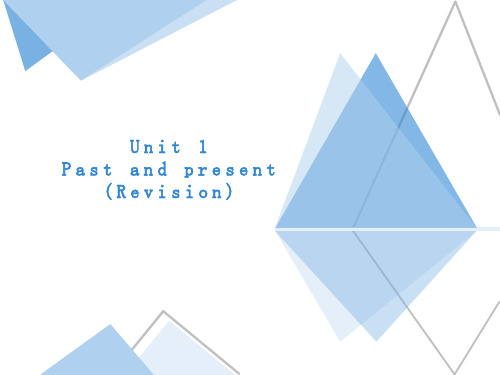
Tips:
for refers to a length of time.
since refers to the beginning of a period
and continues to present.
Fill in the blanks with correct adverbials
1) yet or already
written done
选用 for和 since填空:
1.We haven’t seen each other __f_o_r__ a long time. 2.His father has been in the Party _s_i_n__c_e 10 years
ago.
3.The film has been on __f_o_r__ 20 minutes. 4.Mr Green has worked here s_i_n__c_e_ he came to China.
1.Review unit 1 of 8A, 2.Finish the exercises on the sheet.
Thank you !
Unit 1 Past and present
(Revision)
a place of natural beautya modern town
------The present perfect tense
现在完成时是由助动词have(has)+过去分词构 成。
现在完成时表过去发生的某一动作对现在造成的 影响或结果, 或表示过去已经开始,持续到现在的动 作或状态,也可以表示可能继续下去的动作或状态。 通常和 for, since引导的时间状语连用.以及 so far(至今), by now(直到现在), these days, in the last ten years 等连用。
优秀课件牛津译林版8下Unit1 Grammar课件 (共18张PPT)

3. 一般疑问句及回答: 将have/has提到句首
Have/Has + 主语 + 过去分词---? Yes, --- have/has. No, --- haven’t/hasn’t.
e.g.
_______you _______the film?(watch) Have watched Yes, I _______. have Has watched _______your father ________the film?(watch) hasn’t No, he _______.
2. 否定句:
主语 + have/has + not + 过去分词
e.g. They haven’t _______________ finished their homework yet. (finish)
He _______________ hasn’t finished his homework yet. (finish)
His grandfather has been dead for 3 years. 他的爷爷去世三年了。 2. 过去发生的某一动作对现在造成的影响 Eddie has eaten Hobo's food. 埃迪吃了我的食物。 3.从过去到现在某一动作发生的次数 I have seen the film three times. 这部电影我已经看了三遍了。
对for/since引导的时间词提问用How long
8. 其它:so far 到目前为止 over/during the years 在过去的数年期间 in the past ten years 在过去的十年里 twice/many times 两次/许多次 over the past century在过去的一个世纪里
译林版八年级下册英语Unit1语法专项课件(现在完成时)

I have already seen this film. 我已经看过这部电影了。
I haven’t seen thisn this film yet? 你看过这部电影了没?
Have you finished your homework? 你完成作业了没?
语法透视 现在完成时的用法 考点大观 1) 表示到现在为止已经完成或刚刚完成的动 易错辨析 作。 通关训练
Now we have planted all the trees. 截止目前,我们种完了所有的树。
He has just come back. 他已经回来了。
She has learned English for 5 years. 她学英语已经五年了。 He has lived in Beijing since he was born . 从他出生那天起就住在北京。 Has he lived in Shenzhen for 4 years? 他住在深圳四年了吗?
语法透视 过去分词的变化(规则) 考点大观 (1)一般动词,在词尾直接加“ ed ”。 易错辨析 通关训练
work---worked---worked (2)以“ e ”结尾的动词,只在词尾加“ d ”。 live---lived---lived (3)以“辅音字母 + y ”结尾的动词,将 “y” 变为 “i”,再加“ ed ”。 study---studied---studied (4)重读闭音节结尾,末尾只有一个辅音字母,先双 写该辅音字母,再加“ ed ”。 drop---dropped--dropped
初中英语译林版八年级下册
Unit1
语法专项课件 (现在完成时1)
牛津译林版八年级下册Unit 1 Past and present课件

4. 他们已经改变了许多吗? 是的。
Have they changed a lot? Yes, they have.
A. Who can read the sentences with expressions? B. Who can tell us the basic forms(原形) of the
underlined words? C. Please explain the structure of these sentences.
3.
4.
My suggestion
Remember:
Whatever has changed, Whoever has changed,
You shouldn’t /Don’t
change your kindness, your honesty and your positive energy(正能量) in future.
the city
Past
on foot,by bike/bus
by bus
Present
by bike/bus/und erground
by bus/taxi/car
go to other by coach by
cities
coach/train/
plane
Task 4
Eddie and Hobo are talking about changes .What changes are they talking about? Listen and fill the blanks.
different times .
• 用所给词的正确形式填空 • 1.Tom has two bowls (bowl) of rice for lunch. • 2.Linda didn’t want to listen (listen) to the
牛津译林版八年级英语下册Unit1课件(共56张PPT)

用所给词的适当形式填空:
1. Drinking _p_o_ll_u_t_e_d_ water does harm to one’s health so watepro_ll_u_t_i_o_n__ is really terrible. (pollute)
2. Guang dong Province is in the s_o__u_t_h_e_r_npart of China.
5.改进,改善 improve (名词) improvement
6.形势,情况 situation
7.尽管,即使这样 anyway
8.环境,条件 condition
9.到(在)国外 abroad
10.正是,没错 exactly
11.小学教育的,初级的 primary
12.丈夫 husband
13.妻子 wife
(n.) communication
用所给词的适当形式填空:
1. We can learn a lot about Yangzhou’s Past and
_p_r_e_s__e_n_t____(现在).
2. I can’t imagine how terrible the _s_i_t_u_a_t__io__n(形势) was
(复数) wives
14.环境 environment(形容词) environmental
Part1 Words
1. 北方 north (adj.) northern
2.南方 south (adj.) southern 3.结婚(vt.) marry (adj.) married
(n.)marriage 4.污染 (vt.) pollute (adj.)polluted(n.)pollution 5.采访(vt.) interview (n.) interview (n.)interviewer 6.进来,最近 (adv.) recently (adj.) recent 7.交流,交际(vt.) communicate
牛津译林版八年级下Unit1 Grammar精品课件(共24张PPT)
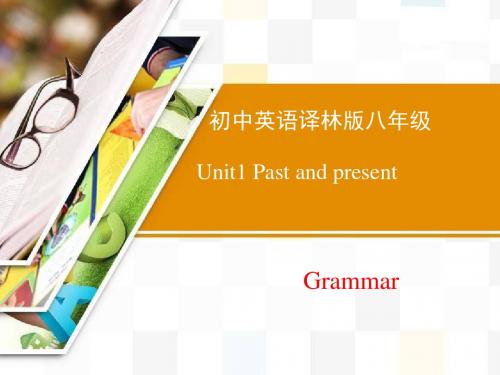
二、句型转换。 1. She has already cleaned the kitchen. (改为否定句) She _________ cleaned the kitchen ________. hasn’t yet 2. They have visited some interesting places in China. (改为一般疑问句)
Sandy?
Sandy: No, I haven’t. What about you?
Millie: I (2)_____(see) one last Saturday. saw
Sandy: What’s it about?
Millie: It’s about the changes in Beijing over the past century. From the film ,I(3) ___________(learn) more have learned about Beijing’s past and present. Sandy: Oh, I think I (4)__________(hear) about the have heard film. Do you plan to see it again?
现在完成时定义
现在完成时定义三要素: 1.表示到现在为止已经完成或刚刚完成的动作。 2.一件发生在过去的事情对现在产生影响。 3.一个动作开始于过去,并持续到现在(也许还将 持续下去)。
观察与思考
1
I have just eaten it.
You have cleaned up the window.
时间段+ ago;3)since+ 从句。
已经,常用于否定句,疑问句尾。 for 长达……,for+ 时间段。 recently 最近,常用于肯定句,否定句或疑问句 中。 ever just 曾经,常用于疑问句。 刚刚,用于肯定句中。
牛津译林版英语八下Unit 1《Past and Present》(Grammar)ppt课件
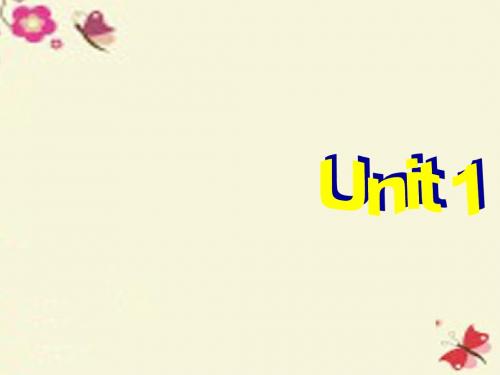
come→come hurt → hurt hold → held win → won lend→lent build → built
catch →caught keep→ kept forget→ forgotten tell→ told be→ been have→ had fall→ fallen fly→ flown draw→ drawn see→ seen
4. We make positive statements in the present perfect tense like this:
I / You/ We / They He / She / It
have arrived.
has
5. We make negative statements in the present perfect tense like this:
Most verbs Verbs ending in -e Verbs ending in a consonant + y Short verbs ending in a vowel + a consonant
+ed +d -y +ied
finish → finished change → changed carry → carried
I / You/ We / They He / She / It
have not arrived.
has
have not = haven’t has not = hasn’t
6. We ask and answer questions using the present perfect tense like this:
新牛津译林版八年级英语下册Unit1 Grammar精品课件(共27张PPT)

have studied 2.We ____________(study) here since 2012. for nearly 2 years.
导入情景二
She has eaten my chocolate.
a. 意思: 过去 (过去/现在), b. 动作发生在__________ 并且已经完成,但对现在有影响。/和现在有联系。 c. has是助动词,eaten是动词过去分词。
He has (just) repaired my pen.
(2) since +
一段时间+ago
eg. since five months ago
过去时的句子 eg. since he began to work
注意2: 此时主句中的动词必须是长动作可延续 性的动词。
现在完成时用法3
1. 这本书我已经读了许多次。 have (already) read I ___________________this book many times.
变y为i再加ed;但以元音字母+y结尾的直接加ed
4. 以“辅元辅”结尾的重读闭音节的动 词:
先双写尾字母,然后再加ed;
5. 不规则动词:
要注意ed的读音
见P13, P122-123
现在完成时用法1
1. Eddie刚吃了Hobo的食物。
has just eaten Hobo’s food. Eddie _______________
repair visit
牛津译林版八年级下册Unit 1《Past and Present》ppt语法课件

三、just, recently是完成时的时间状语, just now 有a moment ago 之意,是 一般过去时的时间状语。
The train has just arrived. 火车刚到。 Did you see Joan just now? 你刚才看到琼了吗? Have you heard from your family lately/recently? 你最近收到家人的来信了吗?
2. 现在完成时的否定句 句型:主语 + have/has+ not+过去分 词 I have not seen the movie yet. He hasn’t been to Beijing since 1)then 、句中有ever直接将ever变为never
2)、若无ever,在助动词have/has之后加not
years/ since two years ago/since 2000. has been (be) in China these • Mr. Green _________ years. have written • They ____________(write) 15 songs so far. has grown (grow) more • The population ____________ slowly in the past ten years.
写出下列动词的过去式和过去分词:
be give see make put come write was/were gave saw made put came wrote been given seen made put come written
注:不规则动词见书上121页不规则动词表.
牛津译林初中八年级下册英语 现在完成时课件

since 5 years ago/ for 5 years
▪ 4. The film has been on since I have come to the
cinema.
came
▪ 5. When has Mr. Li caught a bad cold?
did
catch
▪ 6. Ten years have passed since they got married. has
Present perfect tense 现在完成时
▪ 构成:
have/has + 过去分词
▪ 用法一:
表示过去发生的某一动作 对现在造成的影响或产生 的结果.现在完成时这一时 态强调是过去动作与现在 的联系,也就是强调现在的 影响和结果.
Adverbs of time
before, by now (so far), once, twice…, just, recently yet(否/疑), already(肯), ever, never, all one’s life , in /during the past /last 5 years,
Jack has been to Shanghai twice.
Correcting
▪ 1. I have borrowed the book for 3 months. have kept
▪ 2. My bother has joined the army since he was 18.
has been in/ been a member of the army ▪ 3. Jack and Tom have lived here since 5years.
牛津译林版八年级英语下册Unit1 grammar I教学课件

1. He _h_a_s_n_’_t_f_i_n_is_h_e_d_ (not finish) the homework yet. He will try to finish it quickly.
2. My family _h_a_s_l_iv_e_d_ (live) in Nanjing since 1996.
Sandy: Did you enjoy the exhibition? Millie: Yes, I did. I (9)__le_a_r_n_t_ (learn)
a lot about Beijing’s past and present. It’s a good exhibition and I (10)_h_a_v_e_d_e_c_i_d_e_d_ (decide) to see it again. Do you want to go with me? Sandy: Sure. I won’t miss it this time.
e.g. I have not seen Harry Potter yet.
He hasn’t been to Tianjin since then.
3. 现在完成时的一般疑问句 句型 Have/Has + 主语 + 过去分词
Have you…?
Has he…?
Yes, I have.
Yes, he has.
_现__在__完__成__时___ 则常与just, already, ever, never等副词和these days, this week, since ..., for ...等表示一段时间的时间状 语连用。
3. ① He went to Guilin in 1998. 他在1998年去过桂林。 (这句话只说明他在过去某个时间去 过桂林。)
牛津译林版八年级英语下册Unit1-2Grammar现在完成时课件
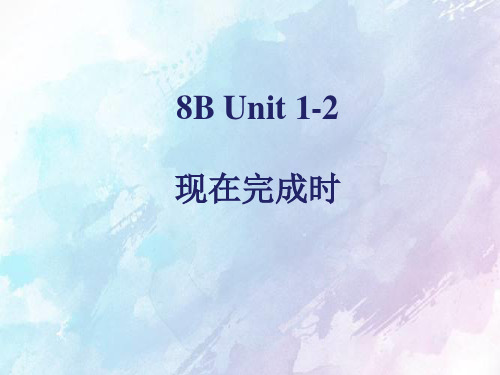
Eddie has eaten my food.
埃迪吃了我的食物。
Eddie ate my food and now Hobo has nothing to eat.
(“居住”这个动作从4年前延续到现在,可能还会继续延续下去。)
Language points
一、现在完成时的含义
(1)现在完成时表示过去发生或已经完成的某一动作对现在造成 的影响或结果。(汉语中常用“已经”、“过”、“了”等表达) 通 常与表示包括现在在内的时间副词just(句中), already(句中,句末 ), before(句末), yet(句末), never(句中), ever(句中) ,recently(句末)等状语连用。例如:
(B) 不规则动词的过去分词 (Page122)
原形 过去式 过去分词 原形 过去式 过去分词
do did done go went gone see saw seen buy bought bought put put put build built built
eat ate eaten find found found forget forgot forgotten come came come cut cut cut write wrote written
Eddie has lived with Millie since he was born. 埃迪自从出生以来,一直和米莉住在一起。
(“居住”这个动作从出生一直延续到现在,可能还要继续延续下去。)
Eddie has lived with Millie for four years. 埃迪已经和米莉居住在一起四年了。
牛津译林版八年级英语下册Unit1现在完成时

牛津译林版八年级英语下册Unit1现在完成时Unit 1现在完成时一、概念一)表示过去发生的或已完成的动作对现在造成的影响或结果。
既涉及过去,又联系现在:动作是过去发生的,结果是现在存在的。
例1:I have already cleaned the classroom.我已打扫好了教室。
(对现在的影响:干净了)(二)表示从过去某一时刻开始一直持续到现在的动作或状态。
例2:He has taught here since 1981.他自1981年就在这儿教书。
(现在还在教)二、结构:__________ + __________三、句型:陈述句、否定句、一般疑问句及其回答方式、特殊疑问句1) He has gone home。
(否定句)He ________ ________ home.2) You have seen the new film。
(一般疑问句以及否定回答)________ you ________ the new film。
No。
I ________.3) I have had XXX.(划线提问)________ ________ you ________ lunch?4) She has been there many times.(划线提问)________ ________ ________ ________ she ________ there?5) We have XXX(划线提问)________ ________ ________ you ________ in Liyuan Middle School?6) Daniel has never read the book before。
________ ________?(反义疑问句)4、标记词(请牢牢记住他们的用法和位置)标记词词义用法位置already已经一定句句中或句末ever 曾经疑问句、一定句句中never从未,从来不陈说句,反面not连用句中(ever)since自从一定、疑问、否认句中for后接一段时间一定、疑问、否认句中just方才,恰好一定句句中yet 还疑问句、否认句末recently近来一定、否认、疑问句句末once。
牛津译林版八年级英语下册Unit 1 Past and present 现在完成时课件

open leave join
---be openclose --be awaydie --be a membebreogfin
get/come/arrive— be in
finish— be over fall ill-- be ill catch a cold -- have a cold
-- keep
用法2:表示动作或状态从过 去开始一直延续到现在甚至将 来
Mike borrowed the books two days ago. Mike has kept the books for two days.
切记有些动词是非延续的,在此用法中要换 成其相对应的延续性动词:
buy
---have borrow
• She….
▲现在完成时态的含义是表示过去发生 的或已完成的动作对现在造成的影响或 结果。特点是既涉及过去,又联系现在: 动作是过去发生的,结果是现在存在的。
She has gone. (她走了。) 从这句话中动词所用的现在完成时态可 以看出“走”的动作是过去发生的,而 对现在所造成的结果是她不在这里了。
---be closed
---be dead
---be on
get up-- be up
wake-- be awake become– be
1.电影已开始十分钟了.
The film_____ _____ ______ for 10 minutes.
2.这工厂开业一年了.
The factory has _____ ______ for one year .
(他学过法语。) 这句话所说明的结果是他现在懂法语。
这种用法常与already, just, yet, ever,
Unit1现在完成时课件2022-2023学年牛津译林版英语八年级下册

He has kept the book for 2 weeks.
句型转换 1. They have finished their homework already. (改为否定句)
________________________________________________________ 2. My father has painted the bookcase. (针对划线部分提问)
since , for 的用法
for+一段时间,since+时间点 对for和since提问用how long 例如: We have known each other for twenty years. →How long have you know each other?
for: (长达)
for+ 时间段
一般疑问: 把助动词 have /has 放在句首have提问have 回答
区别have 和 has的用法
You have planted all the trees. I have planted all the trees. He/she has planted all the trees. They have planted all the trees. We have planted all the trees.
尾的重读闭音节词,先双写这个
plan—planned
辅音字母,再加 ed
常用标志词(一)
I have finished the work.
already(已经(肯)),
→助动词后/句尾
yet(已经(疑);还,仍(否)) →句尾
just(刚刚)
→助动词后
牛津译林版八年级英语下册Unit 1 Past and Presentwelcome优质课件
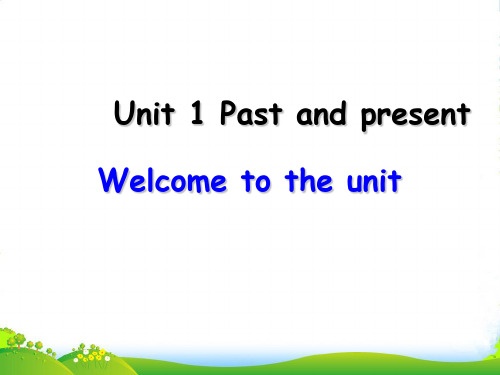
Read and answer:
1. Why didn’t Millie’s Dad go to school by bus?
Because there were too many people on the bus, and it took a long time to wait for the next one.
Transport has changed a lot over the past 100 years.
How about Eddie and Hobo? Have they changed?
1. Is Hobo happy in Picture1? WhyM?aybe Eddie ate Hobo’s food. 2.How does Hobo look in picture 4? What will he say?
places.
underground to … from….
We can go to … by train. We can go to … from… by
underground.
Transport
bus
take the bus by bus
coach
It is a comfortable bus for carrying people over a long way.
li Rapid Transit 快速公交系统
high-speed rail
高铁
Do Part A on P7
Free talk: How did you go to school when you were a primary school student? Did he use to …? How do you go to school now? Why? Discussion: Advantages and disadvantages
牛津译林版八年级英语下册Unit 1 Past and present Grammar精品课件

days. 近几天他去过那里两次了。
4. 表示动作或状态从某一时刻开始, 一直持续到现在的时间状语: so far,
for+ 一段时间, since +过去时间或一般 过去时的句子。
如: I haven't seen him for two years. I haven’t seen him since 2 years ago. It’s 2 years since I saw him. 我两年没有见过他了。
Grammar
Eddie lived here four years ago.
past
present
Eddie has lived with Millie since he was born. Eddie has lived with Millie for four years.
past
present
过去分词 visited stopped finished shopped solved
We add ‘-ed’ to regular verbs.rbs ending in e + d
Verbs ending in - y ied a consonant + y
visit→visited live→lived
15、一年之计,莫如树谷;十年之计,莫如树木;终身之计,莫如树人。2021年7月2021/7/302021/7/302021/7/307/30/2021
16、提出一个问题往往比解决一个更重要。因为解决问题也许仅是一个数学上或实验上的技能而已,而提出新的问题,却需要有创造性的想像力,而且标志着科学的真正进步。2021/7/302021/7/30July 30, 2021
- 1、下载文档前请自行甄别文档内容的完整性,平台不提供额外的编辑、内容补充、找答案等附加服务。
- 2、"仅部分预览"的文档,不可在线预览部分如存在完整性等问题,可反馈申请退款(可完整预览的文档不适用该条件!)。
- 3、如文档侵犯您的权益,请联系客服反馈,我们会尽快为您处理(人工客服工作时间:9:00-18:30)。
注意:当在肯定陈述句中含有already或just 时,在转换成否定句或疑问句时,要把句中的 already 或just 去掉,在句末加上yet.
●
I have seen the film already.
I haven’t seen the film yet.
●
I have done my homework already. I haven’t done my homework yet.
has learned • He ___________(learn) English for three years. • She….
▲现在完成时态的含义是表示过去发生 的或已完成的动作对现在造成的影响或 结果。特点是既涉及过去,又联系现在: 动作是过去发生的,结果是现在存在的。
She has gone. (她走了。) 从这句话中动词所用的现在完成时态可 以看出“走”的动作是过去发生的,而 对现在所造成的结果是她不在这里了。
Chat time
Millie and Sandy are talking about a film about Hong plete their e the correct forms of the verbs in the brackets.
M : ______ Have you ____ seen (see)any exhibitions recently, Sandy? S : No, Ihaven’t _______.What about you? have seen M : Well, I _____________ (see) one. I saw it at the history museum last week . S : What is it about? have forgotten (forget) the title.It’s M : I ______________ about changes in Beijing over the past century.
decided It’s a good exhicide) to see it again .Do you want to go with me ? S : Sure . I won’t mss it this time
Bye-bye!
Making sentences
Mr.Wu asks the students to complete the sentences below using the present perfect tense.Help them complete the sentences. have gone 1. They___________(go) to the cinema already. have not come 2. Mr. And Mrs.Li _________________(not come) back yet. has been (be)to the USA a few times. 3. John__________ 4. We _______________ have not seen (not see)that film yet 5. I _______________ have not talked (not talk)to my cousin since last Friday. have not visited 6. You _________________(not visit)me for a long time.
have heard (hear) S: Oh ,yes . I ________ about it ._____your cousin go ____ Did (go) with you? M : No, he _______.He ________ didn’t has been (be) very busy this week. S : Did you enjoy the exhibition? have learnt (learned) M : Yes, I did.I ___________ (learn)a lot about Beijing’s past and present.
I ________ have done (do) my homework already. not finished He has _____________(not finished) his homework yet. Have been ____you ever _____(be) to Beijing? have We ______ never ______ seen (see) such an exciting match before. cleaned Mother _____ the has just _______(clean) house. Please don’t come in. have practiced They _________________(practice) this dialogue twice.
Look! The blackboard is so clean now. He has cleaned the blackboard. (他已经擦
过黑板了。) (He cleaned the blackboard .and the blackboard is clean now . )这句话所表示的结 果是黑板现在是干净的。
●
Mother has just cleaned the house.
Mother hasn’t cleaned the house yet.
句型转换
1. He has already finished his homework . (否 定句) yet . hasn’t finished his homework_____ He ______ _______ 2.They have just done the work.(疑问句) Have ______ they done _____ the work ____ yet ? Yes ,they have _____ .\ No ,they ______ . haven’t 3. They have seen the film twice .(提问) How many have _____ _____times ______ _____ they seen ______ the film ?
现在完成时态
Present perfect tense 1
一、现在完成时谓语动词的构成:
助动词have/has(not) +V-ed(过去分词)
have finished I ______________(finish) the composition already. • We/You/ They….
He speaks French so fluently. He learned it in Paris. He was there for two years. He has studied French.
(他学过法语。) 这句话所说明的结果是他现在懂法语。
这种用法常与already, just, yet, ever, never, before(句末) recently 等连用.
